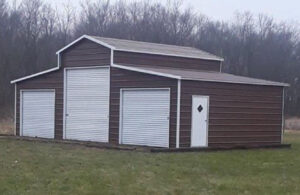
When constructing structural steel barns, selecting the appropriate metal grades is crucial for ensuring durability, strength, and longevity.
Different metal grades offer varying properties that make them suitable for specific structural applications.
Here’s an overview of the key metal grades commonly used in building steel barns.
1. A36 Steel
A36 steel is one of the most widely used grades in structural applications due to its excellent combination of strength, versatility, and affordability. It is a low-carbon steel, making it easy to weld and fabricate. A36 is typically used for beams, columns, and other load-bearing elements in barns. Its mechanical properties include a minimum yield strength of 36,000 psi, which provides adequate support for most agricultural structures.
2. A992 Steel
A992 steel is commonly used in structural applications for its superior strength and toughness. It is a high-strength, low-alloy steel with a yield strength of 50,000 psi, making it ideal for heavy load-bearing structures. A992 is often chosen for beams and columns that require enhanced strength and resistance to bending and buckling. Its improved weldability and resistance to fatigue make it a preferred choice for many builders.
3. A500 Steel
A500 steel is a cold-formed carbon steel used for tubing and other hollow structural sections (HSS). It comes in various grades, with A500 Grade B and Grade C being the most common for structural applications. These grades offer excellent strength-to-weight ratios, making them ideal for framing and bracing in steel barns. A500 steel’s versatility and ease of fabrication contribute to its widespread use in agricultural construction.
4. A572 Steel
A572 steel is a high-strength, low-alloy structural steel that offers enhanced resistance to atmospheric corrosion. Available in several grades, A572 Grade 50 is the most commonly used due to its balanced combination of strength and ductility. With a minimum yield strength of 50,000 psi, A572 is suitable for heavy-duty applications and is often used in structural components that require higher performance, such as trusses and supports.
5. Galvanized Steel
Galvanized steel is coated with a layer of zinc to enhance its resistance to corrosion, making it particularly suitable for outdoor and agricultural environments. This protective coating prevents rust and extends the lifespan of the steel components. Galvanized steel is frequently used for roofing, siding, and other exterior elements of steel barns, ensuring long-term durability even in harsh weather conditions.
Conclusion
Selecting the right metal grades for structural steel barns is essential for ensuring the integrity and longevity of the building. A36, A992, A500, and A572 steels each offer unique properties that make them suitable for various structural applications.
Additionally, the use of galvanized steel provides necessary protection against corrosion, ensuring the barn can withstand the elements. Choose the appropriate metal grades so you can build a steel barn that is strong, durable, and capable of meeting your agricultural needs.
